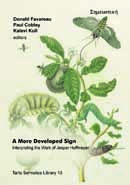Time-plans of the organisms: Jakob von Uexküll’s explorations into the temporal constitution of living beings
Time-plans of the organisms: Jakob von Uexküll’s explorations into the temporal constitution of living beings
Author(s): Riin MagnusSubject(s): Language and Literature Studies
Published by: Tartu Ülikooli Kirjastus
Summary/Abstract: The term “time-plan” is introduced in the article to sum up the diversity of temporal processes described by Jakob von Uexküll (1864–1944) in the framework of the general Planmässigkeit of nature. Although Uexküll hardly had any connections with his contemporary philosophies of time, the theme of the subjective times and timing of the organisms forms an essential part of his umwelt theory. As an alternative to the dominance of evolutionary time in biological discussions, Uexküll took perceptual and developmental times of organisms as his natural scientific priorities. While discussing the characteristics of the latter, Uexküll departs from an epigenetic position. Discussion about perceptual time entails detecting the primary units of time (moments) as well as how the succession of moments results in the perception of movement. The last part of the article will explicate the significance of the “time plan” concept for biophilosophical discussions. It is suggested that the bioethical question rising from Uexküll’s works may take the following form: do other biological subjects besides humans have a right to their own timing?
Journal: Σημειωτκή - Sign Systems Studies
- Issue Year: 39/2011
- Issue No: 2-4
- Page Range: 37-57
- Page Count: 21
- Language: English

